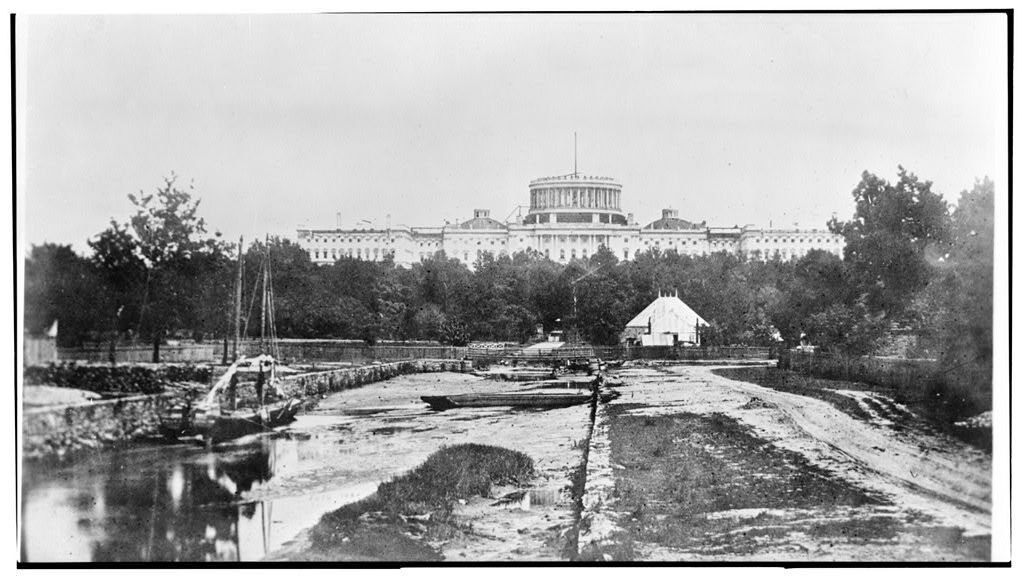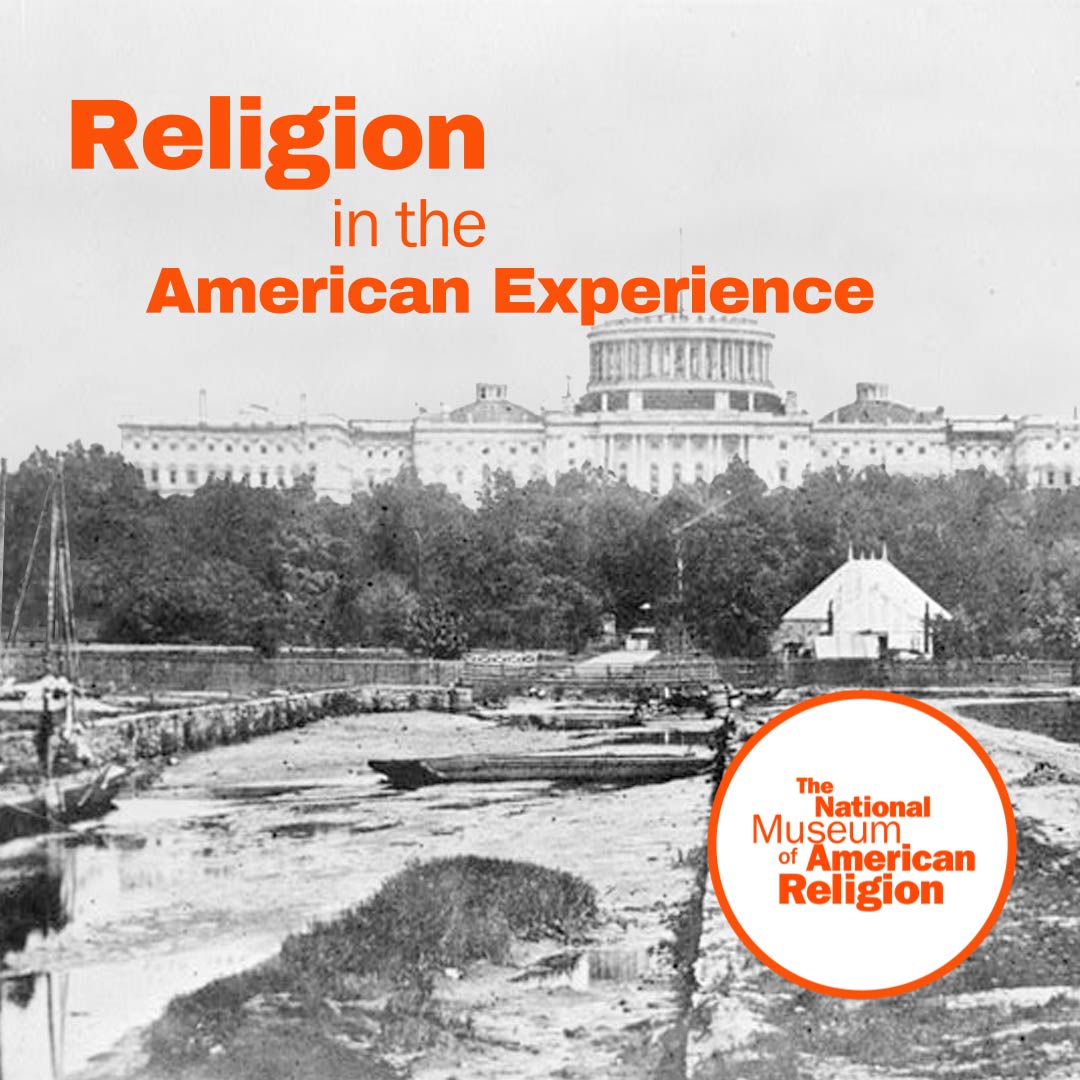
17.3K
Downloads
78
Episodes
Learning from scholars and every day Americans about what religion has done to America and what America has done to religion, helping all of us better comprehend and perpetuate the American experiment in self-government, including what is perhaps its greatest innovation and the essence of the American project: religious freedom as defined by the Constitution’s Article VI and First Amendment religion clauses.
Episodes
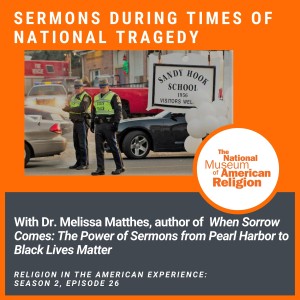
Thursday Dec 09, 2021
What Have America‘s Clergy Told Us During Times of National Tragedy?
Thursday Dec 09, 2021
Thursday Dec 09, 2021
Sermons, the words of the country’s vast number of spiritual leaders, have played significant and even profound roles during times of national crisis. They have comforted those that mourn, given grief higher purposes, and plumbed the depths of evil, suffering, and loss; they have offered hope, courage, vision, and belief in the face of doubt and fear. They have also been key to how the nation defines itself as it reacts to these crises.
Melissa Matthes can help us all better comprehend what sermons at times of national crisis have meant for America. She is Professor of Government at the U.S. Coast Guard Academy, and author of When Sorrow Comes: The Power of Sermons from Pearl Harbor to Black Lives Matter. Dr. Matthes received a Ph.D. from the University of California Santa Cruz and a Master of Divinity from Yale University.
We guarantee that our time together today will help all of us better understand what religion has done to America, and what America has done to religion, and we trust that as a result, listeners will come to better understand how revolutionary and indispensable the idea of religious freedom as a governing principle, is, to the United States and its future.
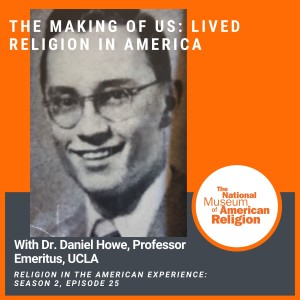
Monday Aug 02, 2021
The Making of US: Lived Religion in America with Daniel Walker Howe
Monday Aug 02, 2021
Monday Aug 02, 2021
Daniel Walker Howe was born January 10, 1937 in Ogden, Utah. Both of his parents were from Utah, though neither were religious. His mother had grown up as a member of The Church of Jesus Christ of Latter-day Saints. His father’s family had come to Utah to work on the railroads. Daniel’s father was a newspaper man who lost his job during the Depression, and who was hired by the Works Progress Administration’s Federal Writers’ Project. He helped write the Utah’s Story under the popular American Guide Series Books.
Daniel graduated from East High School in Denver, went to Harvard as an undergraduate, and received his Ph.D. in history at the University of California, Berkeley in 1966. and is an American historian who specializes in the early national period of U.S. history, with a particular interest in its intellectual and religious dimensions.
Learn about the influence of religious on Daniel’s life, and understand more about what religion has done to Americans, and what Americans have done to religion.
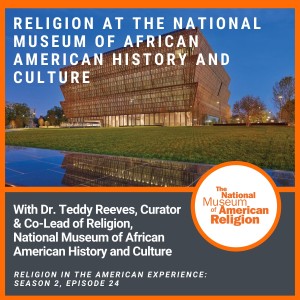
Monday Jul 19, 2021
Religion at the National Museum of African American History and Culture
Monday Jul 19, 2021
Monday Jul 19, 2021
The most recent addition to the Smithsonian museums on the National Mall is the National Museum of African American History and Culture, which opened in September of 2016. This is a profound and exceptionally meaningful addition to the tapestry woven by the museums in D.C.
From the perspective of The National Museum of American Religion, we want to know more about the roles that religion played in the story of slavery and its aftermath.
To do this, we have with us today Teddy R. Reeves, curator of religion at the Smithsonian’s National Museum of African American History and Culture. Mr. Reeves is also a producer, digital theologian, and a fashion and art enthusiast. He earned his B.A. from Hampton University, his Master of Divinity from Princeton Seminary and is currently a PhD candidate at Fordham University.
In 2018 Teddy created a web-based talk-show series for the Museum entitled “gOD-talk: Black Millennials and Faith Conversation”, which explores the dynamic ways Black millennials are engaging with faith in the 21st century. He is a sought-after public speaker, teacher, facilitator and proclaimer.

Monday Jul 05, 2021
How Do Some Foodways Look Like Religion?
Monday Jul 05, 2021
Monday Jul 05, 2021
Food sustains physical life, and as such is of critical importance to each of us. Some in the country have an abundance; hunger or food insecurity gnaws at others: in which group we find ourselves determines much of our current existence. What we eat also touches on other aspects of our lives besides “need”: celebrations, emotional comfort, health, family traditions, and connections or “breaking bread” with others. For the purposes of this podcast series, we are of course interested in uncovering and understanding the connections between religion and food in the United States – what they are, what they mean, and their significance?
To do another deep dive into just one aspect of this fascinating and meaningful subject, we have as our guest Benjamin Zeller, Associate Professor of Religion and Chair of both Religion and Islamic World Studies at Lake Forest College. His research interests include religion in America, religion in culture, religion and science and new religious movements. He is the author of Heaven’s Gate: America’s UFO Religion and Prophets and Protons: New Religious Movements and Science in Late Twentieth-Century America.
For our discussion today, we are looking at his chapter “Quasi-religious American Foodways: The Cases of Vegetarianism and Locovorism” from the book Religion, Food & Eating in North America, edited by Benjamin Zeller, Marie Dallam, Reid Neilson, and Nora Rubel.
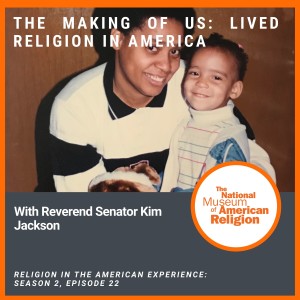
Monday Jun 21, 2021
Monday Jun 21, 2021
Reverend Kim Jackson is an Episcopal priest in the Diocese of Atlanta, vicar at the Church of the Common Ground, which gives services for the homeless and, as of her electoral victory in November 2020, the first out LGBTQ person ever elected to the Georgia state Senate.
Her father served families as a social worker for more than 30 years. Kim's mom, a retired nurse and Professor of Nursing, served as a community nurse for economically disadvantaged families living with Sickle Cell disease.
After graduating from Furman University, Kim volunteered as an EMT and led her colleagues at Emory's Candler School of Theology in advocating for Criminal Justice Reform in Georgia.
Upon receiving her Master of Divinity, Kim commenced her vocation as an Episcopal priest. During ten years of ministry, she served as college chaplain, a nationally renowned consultant and preacher, a parish priest and a social justice advocate.
In 2018, the Georgia House of Representatives commended her for her "tireless efforts on behalf of the disenfranchised, disenchanted, and dispossessed" (GA House Resolution 1188).
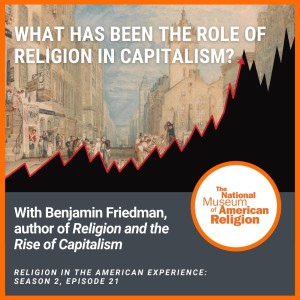
Tuesday Jun 08, 2021
What Has Been the Role of Religion in Capitalism?
Tuesday Jun 08, 2021
Tuesday Jun 08, 2021
Capitalism – a massive influence in the American narrative; loved for driving innovations and raising the standard of living; plagued by the production of opulence and the economic inequality left in its wake. If we understand capitalism better, we understand America better. And, it turns out that religion has played and continues to play a significant role in economics, which is of great interest to this podcast series, “Religion in the American Experience.”
To better comprehend what is going on between religion and economics, we have with us today Professor Ben M. Friedman, the William Joseph Maier Professor of Political Economy at Harvard University, and author of Religion and the Rise of Capitalism. He is a fellow of the American Academy of Arts and Sciences and a member of the Council on Foreign Relations. Mr. Friedman has also written and/or edited fourteen other books, and more than 150 articles in professional journals, aimed primarily at economists and economic policymakers. His two other general interest books have been The Moral Consequences of Economic Growth and Day of Reckoning: The Consequences of American Economic Policy Under Reagan and After.
We guarantee that our time together today will help all of us better understand what religion has done to America, and what America has done to religion, and we trust that as a result, listeners will come to better understand how revolutionary and indispensable the idea of religious freedom as a governing principle, is, to the United States and its future.
Join us in building the “digital first” National Museum of American Religion by donating at storyofamericanreligion.org/contribute, where you can receive a free gift for a donation of $200 or more.

Monday May 17, 2021
How Has Religion Influenced the Development of the U.S. Prison System?
Monday May 17, 2021
Monday May 17, 2021
Americans have always thought hard about how to prevent crime and bring about justice, with the desire to create a flourishing society. The prison system is a critical part of the punishment and rehabilitation system in the United States, which has the largest prison population in the world and the highest per capita incarceration rate. Because of this and other reasons, there are often calls for "prison reform", as is the case today. As the country goes about this work, and because religious thought has always been part of the "crime and punishment" discussion in America, the Museum thought it would be helpful to better understand how religion has played a part in the development of the United States prison system over its history.
This afternoon we have a fantastic panel of scholars who will, in an hour!, help us do this, or at least scratch the surface!
Dr. Vincent Lloyd is an Associate Professor of Christian Ethics and Theories & Methods of Culture, Director of Africana Studies at Villanova University, and co-author with Joshua Dubler, of Break Every Yoke: Religion, Justice and the Abolition of Prisons.
Dr. Jennifer Graber is a Professor in the History of Christianity and Interim Director of Native American and Indigenous Studies at the University of Texas at Austin and author of The Furnace of Affliction: Prisons and Religion in Antebellum America.
Dr. Andrew Skotnicki is a Professor of Religious Studies at Manhattan College and author of Conversion and the Rehabilitation of the Penal System: A Theological Rereading of Criminal Justice and of the forthcoming book Mental Illness, Prophecy and Incarceration: Injustice, Insight and Insanity.
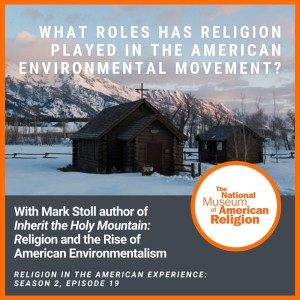
Tuesday May 04, 2021
What Roles Has Religion Played in the American Environmental Movement?
Tuesday May 04, 2021
Tuesday May 04, 2021
Climate change is one of the dominant news stories of the 21st century. Rising sea levels, more fearsome and catastrophic hurricanes, drought, raging wildfires – there is so much here that seems to touch existential fears of humankind. The podcast series “Religion in the American Experience” wishes to understand how religion, one of the greatest forces in the nation’s history and that thing that more than anything else addresses existential questions, figures into American environmentalism, which meets climate change and other challenges facing planet earth, head on.
Today to help us at least begin to uncover some of the relationships between religion and environmentalism, is Mark Stoll, professor of history at Texas Tech University, and author of Inherit the Holy Mountain: Religion and the Rise of American Environmentalism. Mr. Stoll teaches about environmental history of the history of religion and is also the author of Protestantism, Capitalism, and Nature in America and co-editor with Dianne Glave, of To Love the Wind and the Rain: African Americans and Environmental History. He has a Ph.D. in history from The University of Texas at Austin.
We guarantee that our time together today will help all of us better understand what religion has done to America, and what America has done to religion, and we trust that as a result, listeners will come to better understand how revolutionary and indispensable the idea of religious freedom as a governing principle, is, to the United States and its future.
Join us in building The National Museum of American Religion in the nation's capital, to open in 2026, on the 240th anniversary of Thomas Jefferson's immortal words "Almighty God hath created the mind free", by donating at storyofamericanreligion.org/contribute.
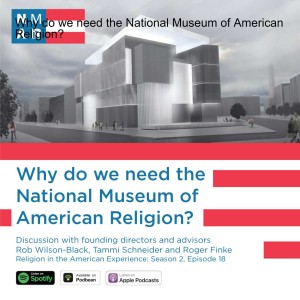
Monday Apr 26, 2021
Why do we need the National Museum of American Religion?
Monday Apr 26, 2021
Monday Apr 26, 2021
The "digital first" National Museum of American Religion addresses the critical gap in Americans' understanding of their own history - the story of what religion has done to America and what America has done to religion, including the establishment of the revolutionary and indispensable idea of religious freedom as a governing principle, is perhaps the last great untold American story.
Our middle and high school history classes, as well as the beautiful museums of the nation's capital, do not fully reveal this tale, which captures the most influential force in our history, for good and ill - the last great untold American story.
Understand America as you never have before.
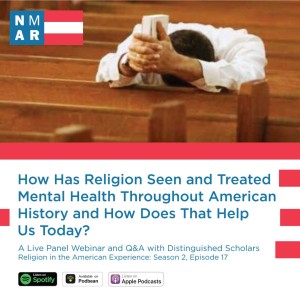
Tuesday Apr 20, 2021
How Has Religion Seen and Treated Mental Illness Throughout American History?
Tuesday Apr 20, 2021
Tuesday Apr 20, 2021
There seems to be some sort of mental health crisis, especially among younger people, in the United States – with many experts blaming social media. Teen suicide is in the news, depression seems to be an ever-growing menace. Then COVID hit last year, which has exacerbated the problem.
Mental health has a special place as seen through the lens of religion – the sicknesses one can’t see, the depression, the darkness, all things “of the soul” are things religion naturally addresses.
At the Museum, we believe it will be instructive for all of us to better understand how religion has seen and addressed mental health throughout U.S. history so that we are better equipped to address the mental health challenges of our present moment.
This morning we have a fantastic panel of scholars:
Dr. Judith Weisenfeld, Agate Brown and George L. Collord Professor of Religion at Princeton University. She is the author of Hollywood Be Thy Name: African American Religion in American Film, 1929-1949, African American Women and Christian Activism: New York’s Black YWCA, 1905-1945, and New World A-Coming: Black Religion and Racial Identity during the Great Migration. Her current research examines the intersections of psychiatry, race, and African American religion in the late 19th and early 20th centuries;
Dr. Andrew Walker-Cornetta, Postdoctoral Research Associate at the John C. Danforth Center on Religion and Politics at Washington University in St. Louis. His research focuses on how religious communities have shaped the history of disability in the United States. In August, he will begin a position as Assistant Professor in the Department of Religious Studies at Georgia State University.
Dr. Barbara McClure, Associate Professor of Pastoral Theology and Practice at Brite Divinity School at Texas Christian University, and author of Emotions: Problems and Promise for Human Flourishing. Her primary interests lie primarily in the meaning of and means toward human flourishing, respecting both the fractured character of human nature and the religious impulse for wholeness and coherence;
Dr. Kameelah Rashad, Founder and President of Muslim Wellness Foundation (MWF) and the founding co-Director of the National Black Muslim COVID Coalition. She is a Visiting Assistant Professor of Psychology and Muslim Studies at Chicago Theological Seminary;
And, Dr. Elizabeth Hayes Alvarez, Associate Professor of Religion at Temple University, and author of The Valiant Woman: The Virgin Mary in Nineteenth-Century American Culture. She is currently a Scattergood Fellow working on a book entitled Challenging the Great Physician: Christian Responses to the Rise of Psychiatry in America.
